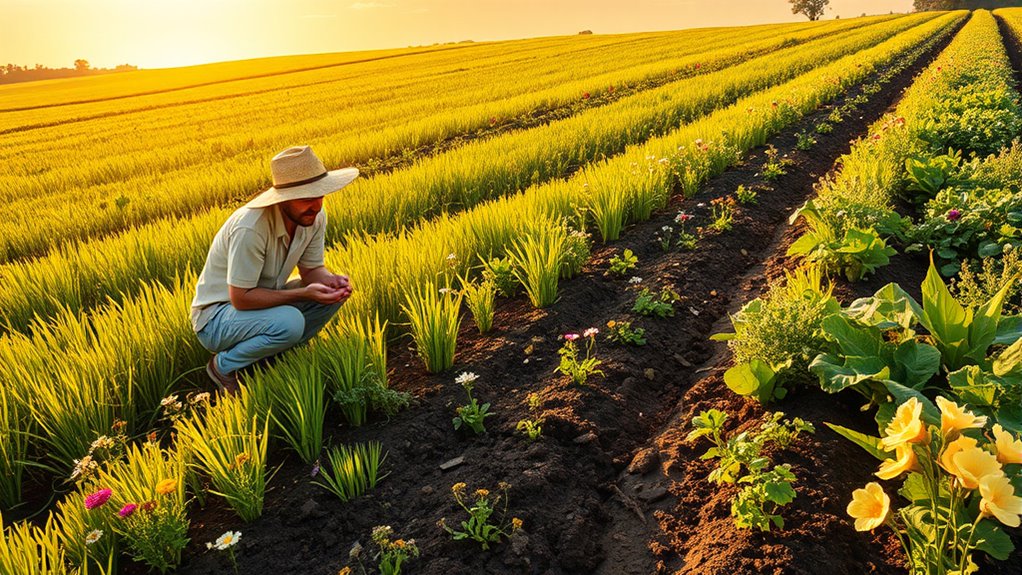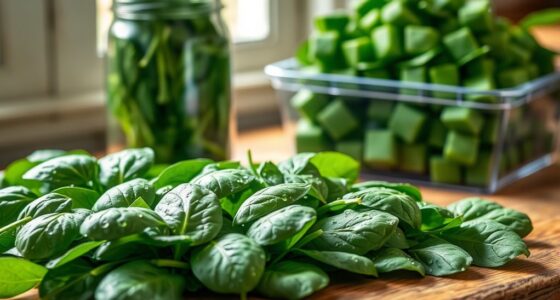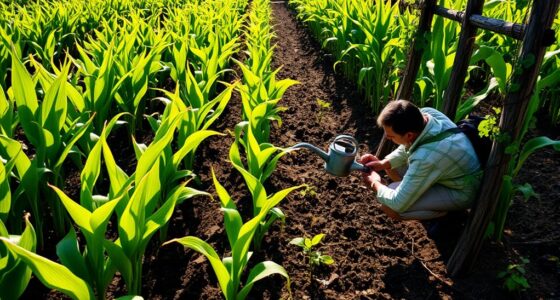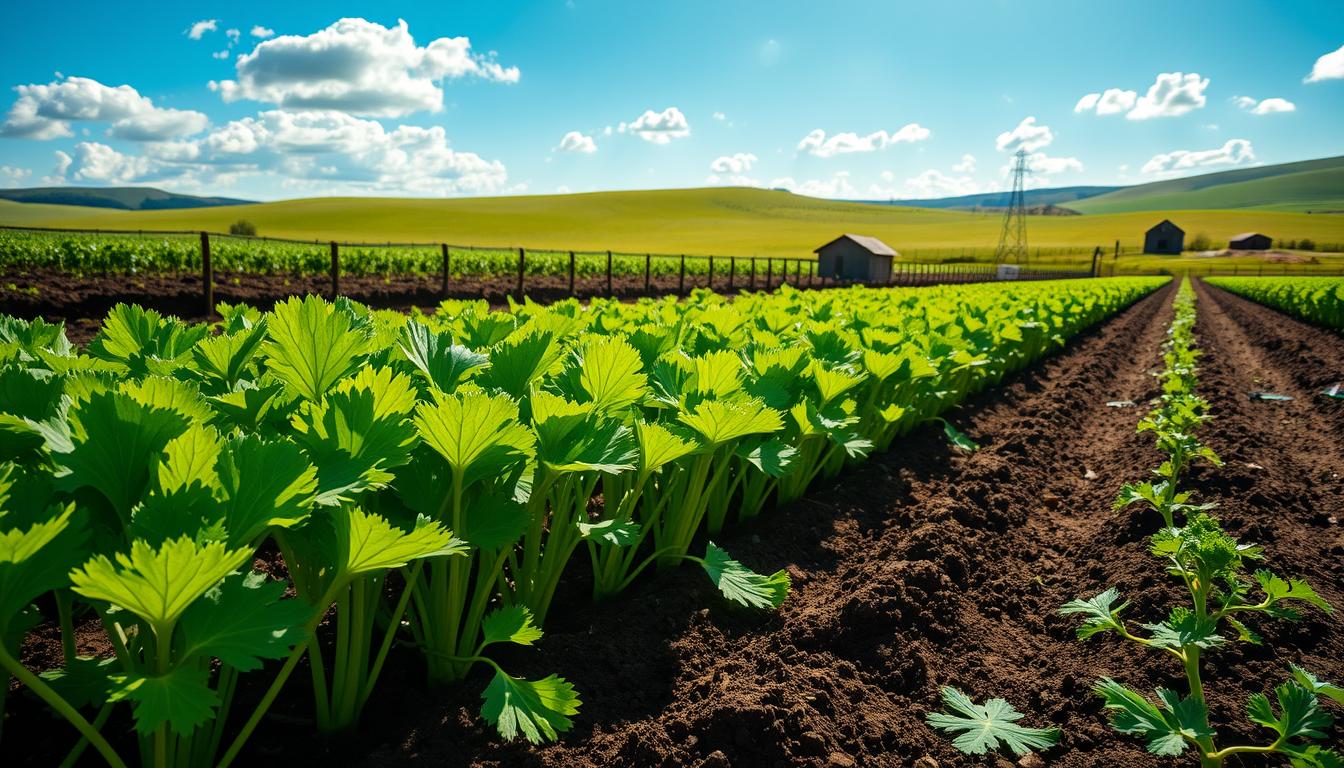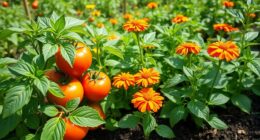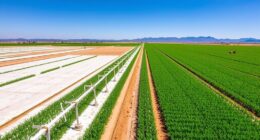Organic farming's all about sustainable practices that promote ecological balance and prioritize health. You'll avoid synthetic chemicals, using natural methods instead. The core principles include the interconnectedness of soil, plants, animals, and humans, as well as fairness and care for future generations. Key practices involve crop rotation, composting, and biological pest control. This approach not only benefits the environment but also offers economic advantages for farmers and communities. There's more to uncover about its global impact and statistics.
Key Takeaways
- Organic farming prioritizes ecological balance, focusing on maintaining natural crops without synthetic products or chemicals.
- Core principles include health, ecology, fairness, and care, guiding sustainable agricultural practices.
- Key practices involve crop rotation, composting, biological pest control, and reduced tillage to enhance soil health and productivity.
- Environmental benefits include improved soil carbon storage, reduced greenhouse gas emissions, and enhanced biodiversity.
- Economic advantages consist of premium pricing for organic products, lower production costs, and strengthened local economies through job creation.
Definition and History of Organic Farming
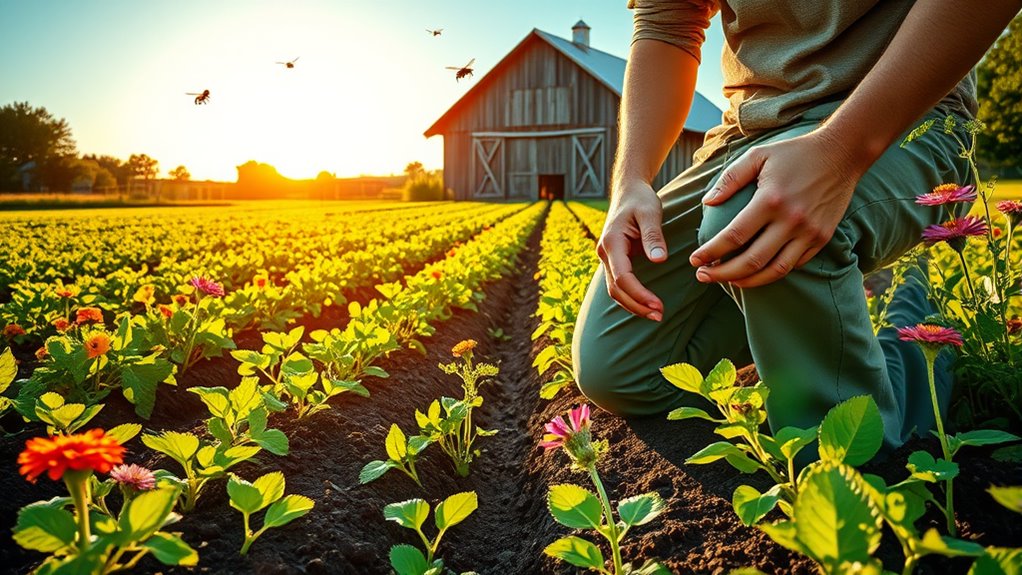
Organic farming represents a sustainable approach to agriculture that prioritizes ecological balance and natural processes over synthetic chemicals. This agricultural system focuses on maintaining natural crops without synthetic products, emphasizing biodiversity, soil conservation, and natural pest control.
The modern organic movement began in the 1930s, driven by concerns over chemical pesticides and fertilizers' environmental impact. Influential figures like Rudolf Steiner and Lady Eve Balfour championed holistic farming practices and experiments promoting non-intensive agriculture.
The publication of Rachel Carson's *Silent Spring* in 1962 further highlighted the dangers of pesticides, fostering interest in organic methods. As organic farming evolved, certification standards emerged to ensure compliance, reflecting a growing commitment to sustainable practices that benefit the environment and consumers alike.
Core Principles of Organic Agriculture
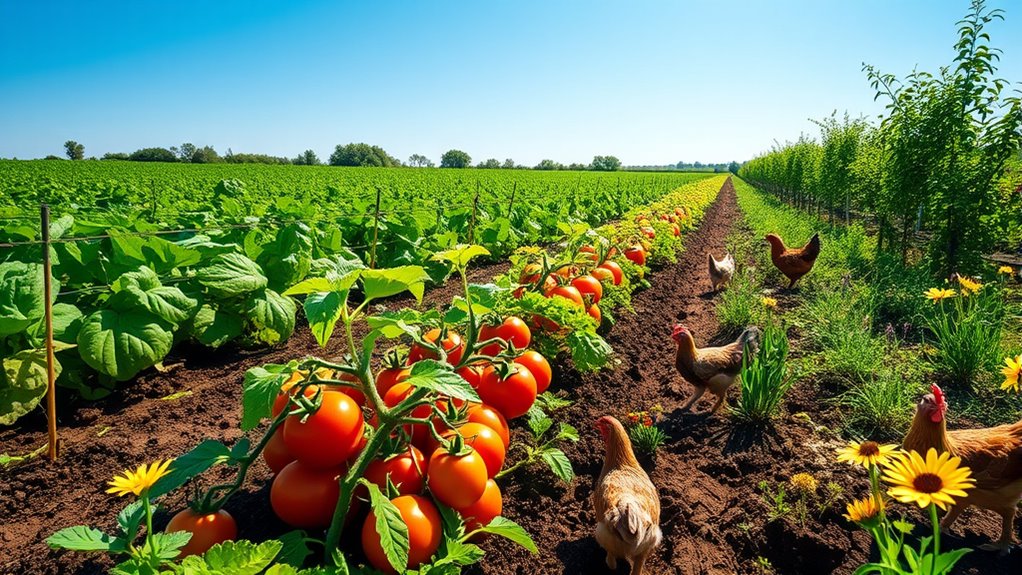
While many agricultural practices focus solely on productivity, the core principles of organic agriculture prioritize the health of ecosystems, communities, and future generations.
The Principle of Health emphasizes the interconnectedness of soil, plants, animals, and humans, aiming for holistic well-being.
The Principle of Health highlights the vital connections among soil, plants, animals, and humans for overall well-being.
The Principle of Ecology calls for sustainable practices that respect local ecosystems and promote biodiversity.
Fairness ensures equitable relationships among all stakeholders, enhancing quality of life and supporting food sovereignty.
Lastly, the Principle of Care advocates for responsible management, protecting both current and future generations.
These principles not only guide organic farming standards but also foster a sustainable approach to agriculture that benefits the entire planet.
Key Practices in Organic Farming
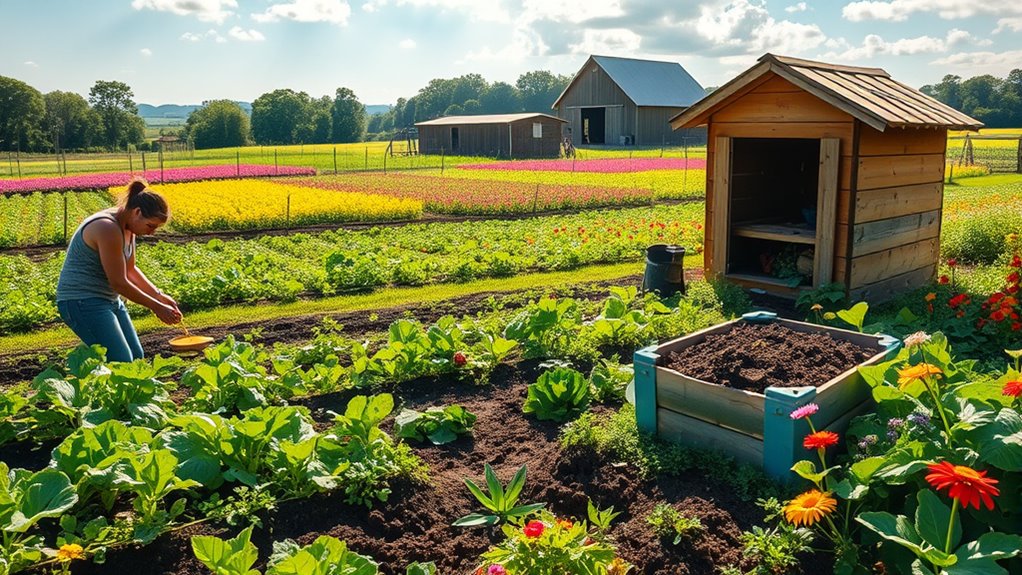
Effective organic farming relies on a diverse array of practices that enhance soil health, promote biodiversity, and ensure sustainable crop production.
You can start by implementing crop rotation to maintain soil vitality and reduce pests. Cover cropping and green manures will help prevent erosion and improve fertility. Composting enriches your soil with nutrient-rich amendments.
For pest management, consider biological pest control, using natural predators instead of synthetic pesticides. Employing techniques like reduced tillage, mulching, and intercropping can further enhance soil management.
Drip irrigation and rainwater harvesting will aid in conserving water. By fostering biodiversity through polyculture and agroforestry, you'll create a resilient farming ecosystem.
Embracing these key practices is vital for successful organic farming.
Environmental Benefits of Organic Farming
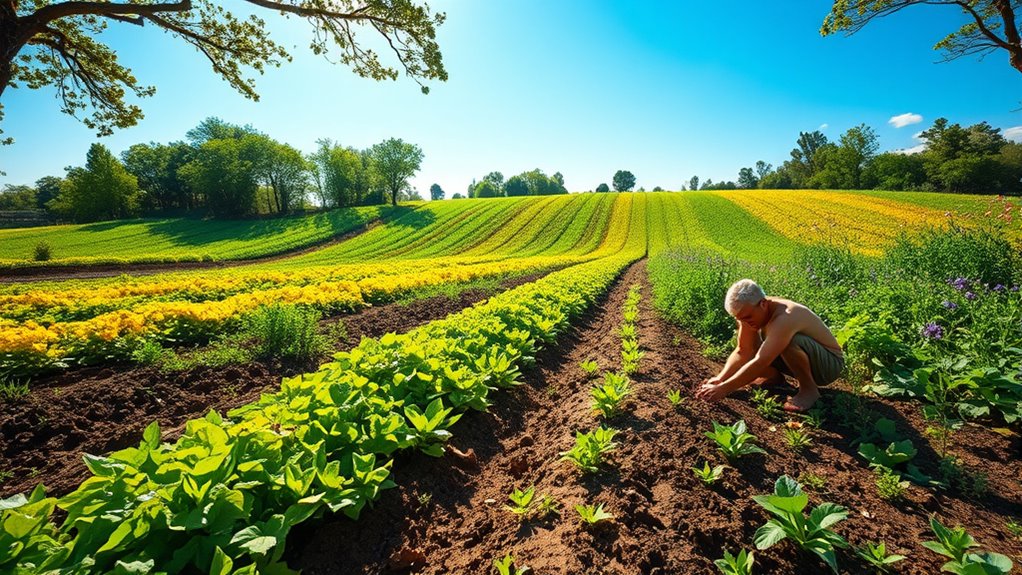
When you choose organic farming, you're not just growing food; you're also nurturing the environment. By limiting synthetic fertilizers, you reduce greenhouse gas emissions and promote a sustainable food production process.
Your practices enhance soil health, allowing it to store 25% more carbon than conventional methods, helping combat climate change. You also prevent chemical runoff, protecting waterways and aquatic life.
With techniques like drip irrigation, you conserve water and maintain its quality. Plus, by fostering biodiversity, you create habitats for various species, enhancing ecosystem resilience.
Organic farming not only supports healthy soils and diverse crops but also contributes to the preservation of natural ecosystems, ensuring a balanced and thriving environment for future generations.
Economic and Social Advantages
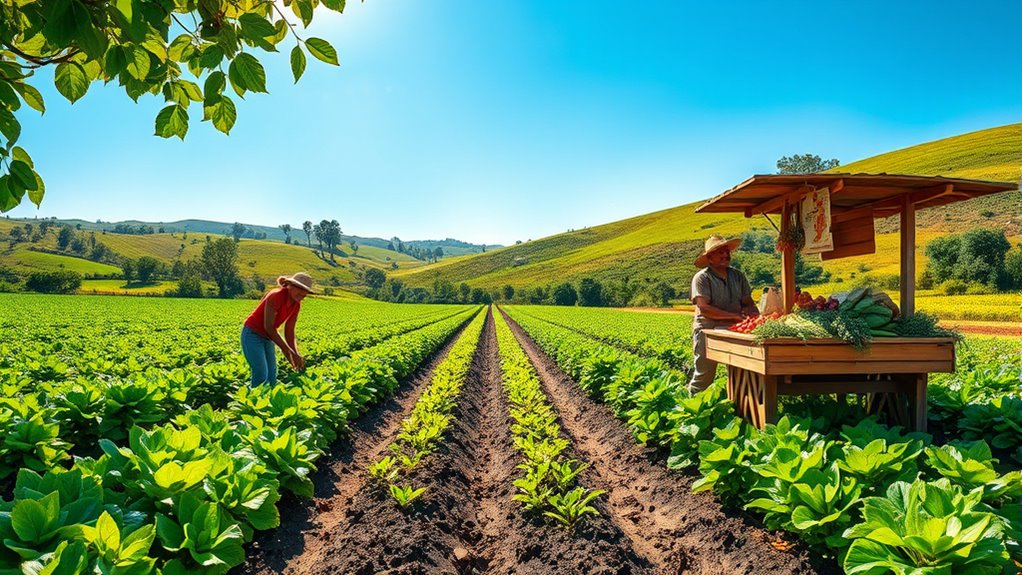
Organic farming not only supports environmental sustainability but also offers significant economic and social advantages.
You'll find that organic products often sell at premium prices, boosting profitability for farmers. With lower production costs from reduced synthetic inputs, you'll enjoy better financial stability. The diversification of crops and livestock minimizes risks tied to market fluctuations and enhances resilience.
Socially, organic farming fosters rural economic growth by keeping money in local communities and creating job opportunities with its labor-intensive practices.
It promotes farmworker health by reducing exposure to harmful pesticides and encourages community engagement through local markets. Additionally, organic farming strengthens food security by building diverse and resilient food systems.
Embracing organic methods benefits both you and your community.
Global Adoption Trends and Statistics
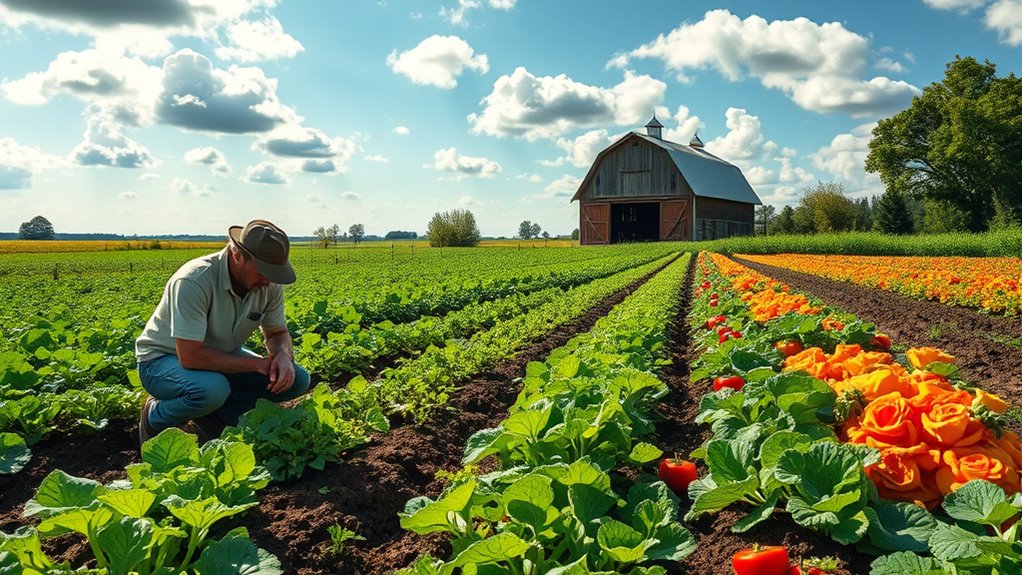
How has the landscape of organic farming evolved globally?
In 2023, organic agricultural land expanded to nearly 99 million hectares, with notable growth in Latin America, Europe, and Africa. Oceania still holds the largest area, making up over half of the global total, while Australia leads with 53 million hectares.
Despite this growth, the number of organic producers fell by 4% mainly due to declines in India and Thailand. Africa saw a remarkable 24.4% increase in organic farmland, showcasing its potential.
The decline in organic producers contrasts with Africa's impressive 24.4% growth in organic farmland, highlighting its emerging potential.
While North America experienced a slight downturn, global retail sales of organic products surpassed 136 billion euros, indicating strong market demand.
This growth illustrates the increasing importance of organic farming in sustainable agriculture worldwide.
Frequently Asked Questions
What Are the Certification Requirements for Organic Farming?
To get certified for organic farming, you need to meet specific requirements.
First, your farm must generate over $5,000 in organic sales annually.
Next, ensure your land is free of prohibited substances for at least three years.
You'll pick a USDA-accredited certifying agency to oversee your certification process.
Regular inspections will verify your compliance, and you'll need to maintain detailed records of your practices to keep your certification active.
How Does Organic Farming Affect Food Taste and Quality?
Organic farming can enhance the taste and quality of the food you eat. Many people find organic produce tastes better, attributing this to traditional varieties and peak ripeness at harvest.
You might notice that organic fruits are often sweeter, thanks to improved soil health. Additionally, organic practices promote biodiversity, which can lead to richer flavors and nutrient profiles.
Can Organic Farmers Use Any Pesticides?
You might think organic farmers can use any pesticides, but that's not the case.
They're actually limited to naturally derived options, like diatomaceous earth and certain plant extracts. While synthetic pesticides are rarely allowed, there are exceptions, such as boric acid.
Each pesticide used must comply with strict regulations, ensuring that farmers report their usage to maintain their organic certification.
What Challenges Do Organic Farmers Face?
As an organic farmer, you face several challenges.
Weed management can be a significant headache, with many struggling to control them effectively. Disease control without synthetic chemicals adds complexity to your practices. Labor costs are often higher due to intensive methods.
You also grapple with maintaining soil health, which is crucial for your crops. Additionally, you might experience yield variability, making consistent profits more difficult to achieve in your farming journey.
How Do Consumers Find Organic Products?
You'll find organic products through various avenues.
Look for certification labels like the USDA Organic seal on packaging, signaling compliance with organic standards. Many grocery stores feature dedicated sections for organic items, making them easy to spot.
If you prefer shopping online, use filters to narrow your search. Farmers' markets are also great places to discover fresh organic produce while interacting with local producers directly.
These options enhance your organic shopping experience.
Conclusion
In conclusion, organic farming fosters a flourishing future through its foundational principles and practices. By prioritizing planet-friendly production, you contribute to cleaner ecosystems and healthier communities. As you embrace these sustainable strategies, you not only enhance your environment but also empower economic growth and social well-being. With growing global interest, the movement toward organic agriculture is gaining momentum, making it a promising path toward a prosperous, planet-conscious world. Join the journey and reap the rewards!

